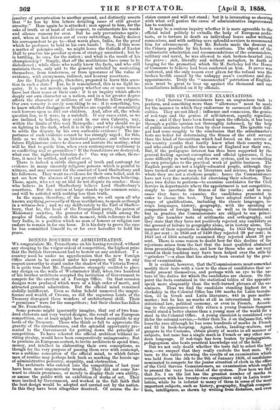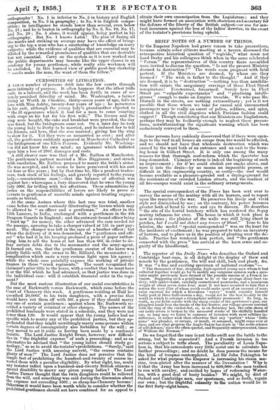THE CIVIL SERVICE EXAMINATIONS.
THE Civil Service Commissioners have an ungracious task to perform, and something more than " allowance " must be made for the manner in which they endeavour to surmount their diffi- culties. They are not liked ; influence and connexion, the genius of red-tape and the genius of self-interest, equally repudiate them ; and if they have been forced upon the officials, it has been through a public opinion not thoroughly informed, by the help of public instincts rather than by clear reason. The ignoble vul- gar had come roughly to the conclusion that the schoolmaster's tests are better for determining the fitness of the civil servant than the kind of favouritism which had forced on the service of the country youths that hardly knew what their country was, and who could spell neither the name of England nor their own. But, if the pedagogue interest has thus been supported. by the general feeling against corruption and official ignorance, it has some difficulty in working out its own system, and in reconciling its own principles to the practical work of public business. The English people are not a highly-educated people, although they have turned out great men in literature and science, for upon the whole they are not a studious people: hence the Commissioners have not very fine materials for exercising-their selection. They have two duties to perform—to examine candidates for the Civil Service in departments where the appointment is not competitive, simply to ascertain the fitness of the youths; and in some eases they have to examine the candidates presented in order to choose the best. They have adopted rather a high range of qualifications, including the classic languages, fo- reign languages, history, geography, with the speaking or composition of foreign languages, as well as in translation ; but in practice the Commissioners are obliged to use princi- pally the humbler tests of arithmetic and orthography, and they state that they have not positively rejected any candidate on the ground of failure in geography alone, or in history alone. The number of their rejections is diminishing. In 1855 they rejected 31.5 percent; in 1856 out of 2430 they rejected 39 percent; in 1857 out of 1954 actually examined they rejected about 28 per cent. There is some reason to doubt how far this decline of the rejections arises from the fact that the least qualified abstained from presenting themselves, and how far those who are not very sound in their teaching may have been helped over the stile by "grinders "—a class that has already been created by the prac- tice of examination.
It is evident, however, that the:Conimissioners must somewhat modify their .tests with a view to the class of candidates that ac- tually present themselves, and perhaps with an eye to the nas tune of the duties for which the candidates are chosen. On this point the facts contained in the statistical tables of the appendix speak more eloquently than the well-tuned phrases of the ex- aminers. Thus we find the candidate standing highest for a clerkship in the Colonial Office has 190 marks for Latin transla- tion, 35 in Greek and Latin literature, 445 in pure mathe- matics; but he has no marks at all in international law, con- stitutional law, political economy, or even in French. Accord- ing to the appearance of this return a young Dominic Sampson would stand a better chance than a young man of the world for a stool in the Colonial Office. A. young classicist is considered very fit for the colonial service,—better thanNo. 5 on the:same list, who loses the race although he has some hundreds of marks in French and 32 in book-keeping. Again, clerks, landing-waiters, and gaugers in the Customs, obtain plenty of marks in all manner of subjects, but none has a single mark ni French or any other mo- dern language. If red-tape has been beaten bypeclagoguism, pedagogiusin also beats practical knowledge out of the field. But we not only doubt whether the tests fail to select the best men,—we suspect that they really exclude the best men. We turn to the tables showing the results of an examination !Finch was held from the 5th to the 8th of January 1858, of candidates nominated to compete for the junior situation of clerk in.the office of the Civil Service Commissioners, an examination which ought to present the very beau ideal of the system. Now here we find that No. 1 on the list has the greatest number of marks in comparison with his twenty-two competitors only in Latin trans- lation, while he is inferior to many of them in some of the most important subjects, such as history, geography, English composi- tion, intelligence, as shown by writing from dictation, and even orthography! No. 1 is inferior to No. 5 in history and English composition, to No. 3 in geography ; to No. 8 in English compo- sition; in intelligence he stands lower than several, es-en below No. 21; and he is beaten in orthography by No. 3, No. 10, No. 17, and No. 20; No. 5 alone, it would appear, being perfect in his orthography. But No. 1 knows Latin ! The plan of fusing all the marks and striking an average may have the effect of bring- ing to the top a man who has a smattering of knowledge on many subjects; while the evidence of qualities that are essential may be diluted by the rewarded prominence of qualities that are desirable but not essential. Carry on the system as it is now worked and the public departments may become like the upper classes in an academy for young gentlemen, while really able workmen will be excluded. In this learned view of public good-boy clerkship " marks make the man, the want of them the fellow."



































 Previous page
Previous page